Analysis of Accounting Roles, Ethical Dilemmas, Business Structures
VerifiedAdded on 2023/06/10
|14
|2287
|127
Homework Assignment
AI Summary
This assignment comprehensively examines key aspects of accounting and business management. The first part of the assignment analyzes the roles of bookkeepers and accountants, comparing their responsibilities, advantages, and disadvantages. The second part addresses ethical dilemmas in the accounting profession, using a case study to illustrate the decision-making process and the importance of ethical frameworks. Finally, the assignment explores different business structures, such as sole proprietorships, partnerships, and companies, providing recommendations based on specific business scenarios and expansion needs. The analysis includes relevant references to support the arguments presented, offering a well-rounded understanding of the topics covered.
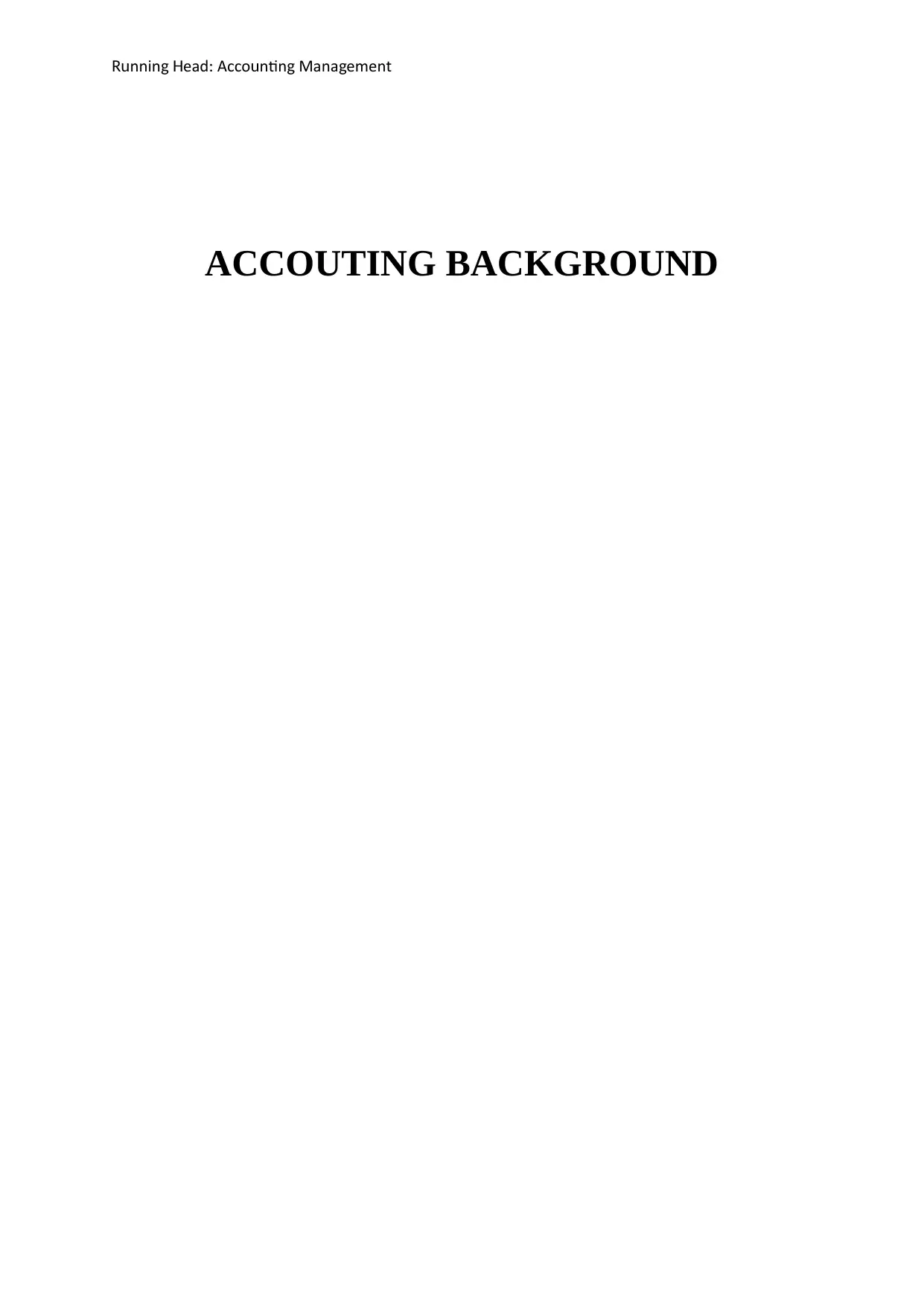
nnin ead Acco ntin Mana ementRu g H : u g g
ACCOUTING BACKGROUND
ACCOUTING BACKGROUND
Paraphrase This Document
Need a fresh take? Get an instant paraphrase of this document with our AI Paraphraser
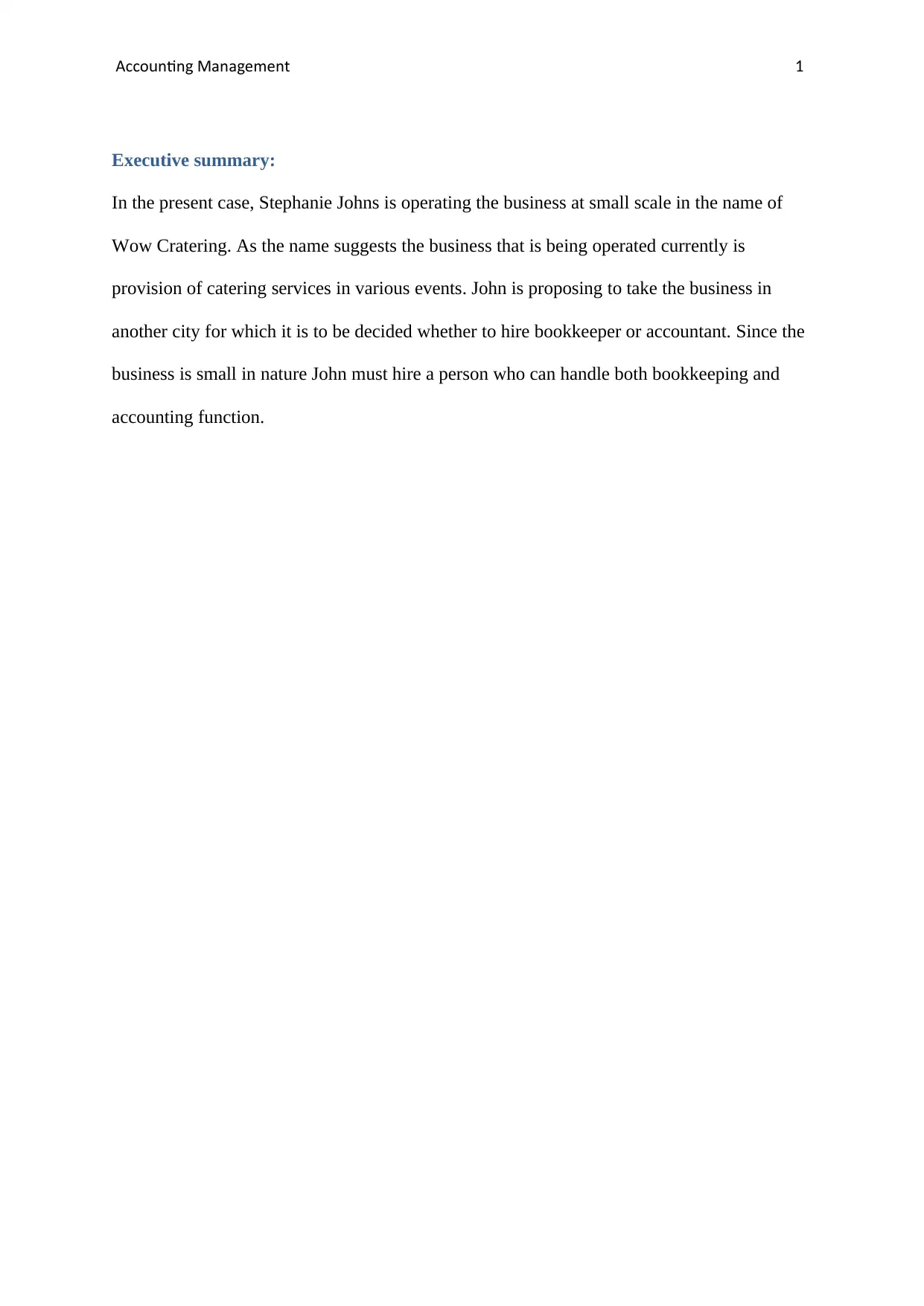
Acco ntin Mana ementu g g 1
Executive summary:
In the present case, Stephanie Johns is operating the business at small scale in the name of
Wow Cratering. As the name suggests the business that is being operated currently is
provision of catering services in various events. John is proposing to take the business in
another city for which it is to be decided whether to hire bookkeeper or accountant. Since the
business is small in nature John must hire a person who can handle both bookkeeping and
accounting function.
Executive summary:
In the present case, Stephanie Johns is operating the business at small scale in the name of
Wow Cratering. As the name suggests the business that is being operated currently is
provision of catering services in various events. John is proposing to take the business in
another city for which it is to be decided whether to hire bookkeeper or accountant. Since the
business is small in nature John must hire a person who can handle both bookkeeping and
accounting function.
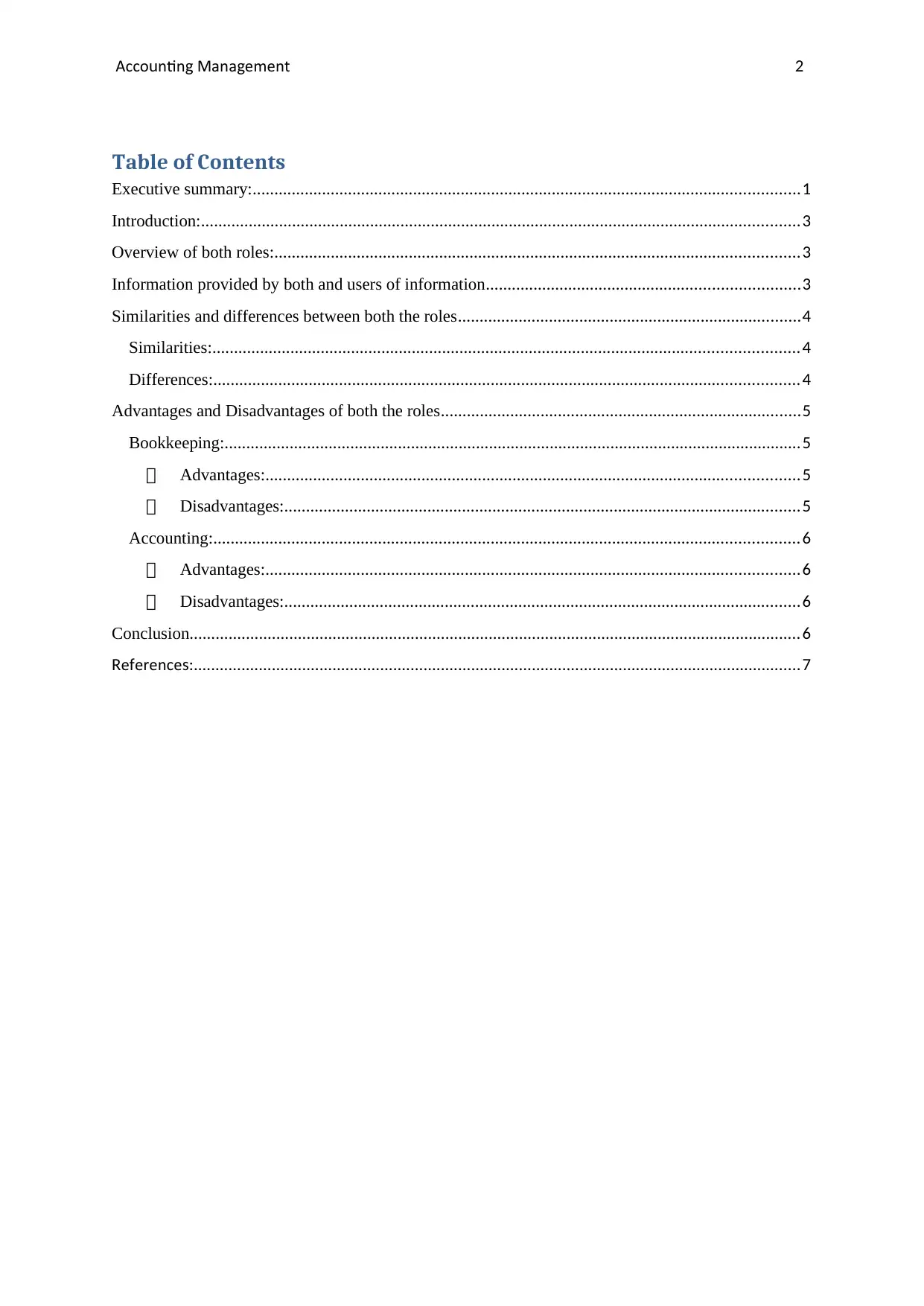
Acco ntin Mana ementu g g 2
Table of Contents
Executive summary:..............................................................................................................................1
Introduction:..........................................................................................................................................3
Overview of both roles:.........................................................................................................................3
Information provided by both and users of information........................................................................3
Similarities and differences between both the roles...............................................................................4
Similarities:.......................................................................................................................................4
Differences:.......................................................................................................................................4
Advantages and Disadvantages of both the roles...................................................................................5
Bookkeeping:.....................................................................................................................................5
Advantages:...........................................................................................................................5
Disadvantages:.......................................................................................................................5
Accounting:.......................................................................................................................................6
Advantages:...........................................................................................................................6
Disadvantages:.......................................................................................................................6
Conclusion.............................................................................................................................................6
e erenceR f s:............................................................................................................................................7
Table of Contents
Executive summary:..............................................................................................................................1
Introduction:..........................................................................................................................................3
Overview of both roles:.........................................................................................................................3
Information provided by both and users of information........................................................................3
Similarities and differences between both the roles...............................................................................4
Similarities:.......................................................................................................................................4
Differences:.......................................................................................................................................4
Advantages and Disadvantages of both the roles...................................................................................5
Bookkeeping:.....................................................................................................................................5
Advantages:...........................................................................................................................5
Disadvantages:.......................................................................................................................5
Accounting:.......................................................................................................................................6
Advantages:...........................................................................................................................6
Disadvantages:.......................................................................................................................6
Conclusion.............................................................................................................................................6
e erenceR f s:............................................................................................................................................7
⊘ This is a preview!⊘
Do you want full access?
Subscribe today to unlock all pages.

Trusted by 1+ million students worldwide
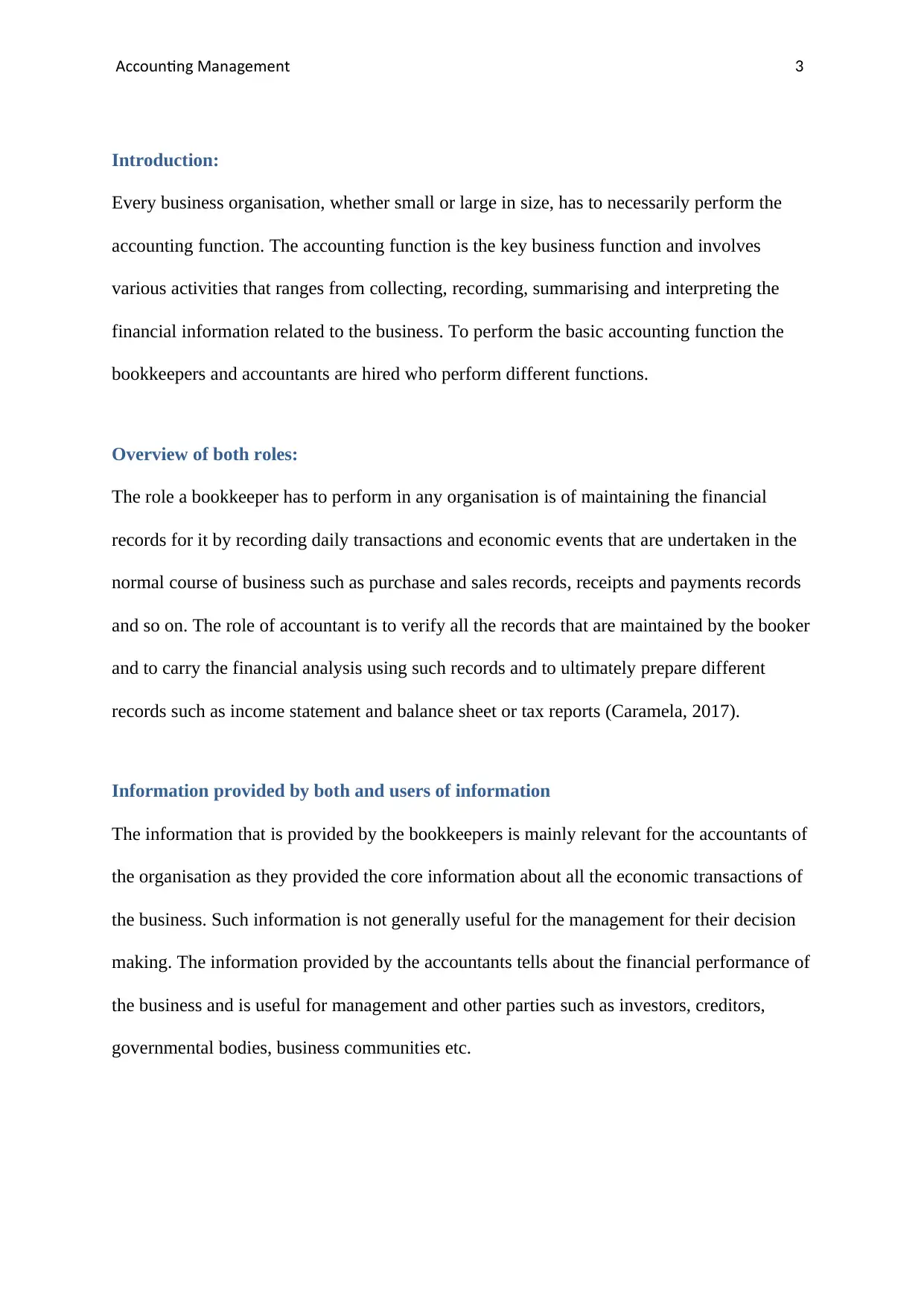
Acco ntin Mana ementu g g 3
Introduction:
Every business organisation, whether small or large in size, has to necessarily perform the
accounting function. The accounting function is the key business function and involves
various activities that ranges from collecting, recording, summarising and interpreting the
financial information related to the business. To perform the basic accounting function the
bookkeepers and accountants are hired who perform different functions.
Overview of both roles:
The role a bookkeeper has to perform in any organisation is of maintaining the financial
records for it by recording daily transactions and economic events that are undertaken in the
normal course of business such as purchase and sales records, receipts and payments records
and so on. The role of accountant is to verify all the records that are maintained by the booker
and to carry the financial analysis using such records and to ultimately prepare different
records such as income statement and balance sheet or tax reports (Caramela, 2017).
Information provided by both and users of information
The information that is provided by the bookkeepers is mainly relevant for the accountants of
the organisation as they provided the core information about all the economic transactions of
the business. Such information is not generally useful for the management for their decision
making. The information provided by the accountants tells about the financial performance of
the business and is useful for management and other parties such as investors, creditors,
governmental bodies, business communities etc.
Introduction:
Every business organisation, whether small or large in size, has to necessarily perform the
accounting function. The accounting function is the key business function and involves
various activities that ranges from collecting, recording, summarising and interpreting the
financial information related to the business. To perform the basic accounting function the
bookkeepers and accountants are hired who perform different functions.
Overview of both roles:
The role a bookkeeper has to perform in any organisation is of maintaining the financial
records for it by recording daily transactions and economic events that are undertaken in the
normal course of business such as purchase and sales records, receipts and payments records
and so on. The role of accountant is to verify all the records that are maintained by the booker
and to carry the financial analysis using such records and to ultimately prepare different
records such as income statement and balance sheet or tax reports (Caramela, 2017).
Information provided by both and users of information
The information that is provided by the bookkeepers is mainly relevant for the accountants of
the organisation as they provided the core information about all the economic transactions of
the business. Such information is not generally useful for the management for their decision
making. The information provided by the accountants tells about the financial performance of
the business and is useful for management and other parties such as investors, creditors,
governmental bodies, business communities etc.
Paraphrase This Document
Need a fresh take? Get an instant paraphrase of this document with our AI Paraphraser
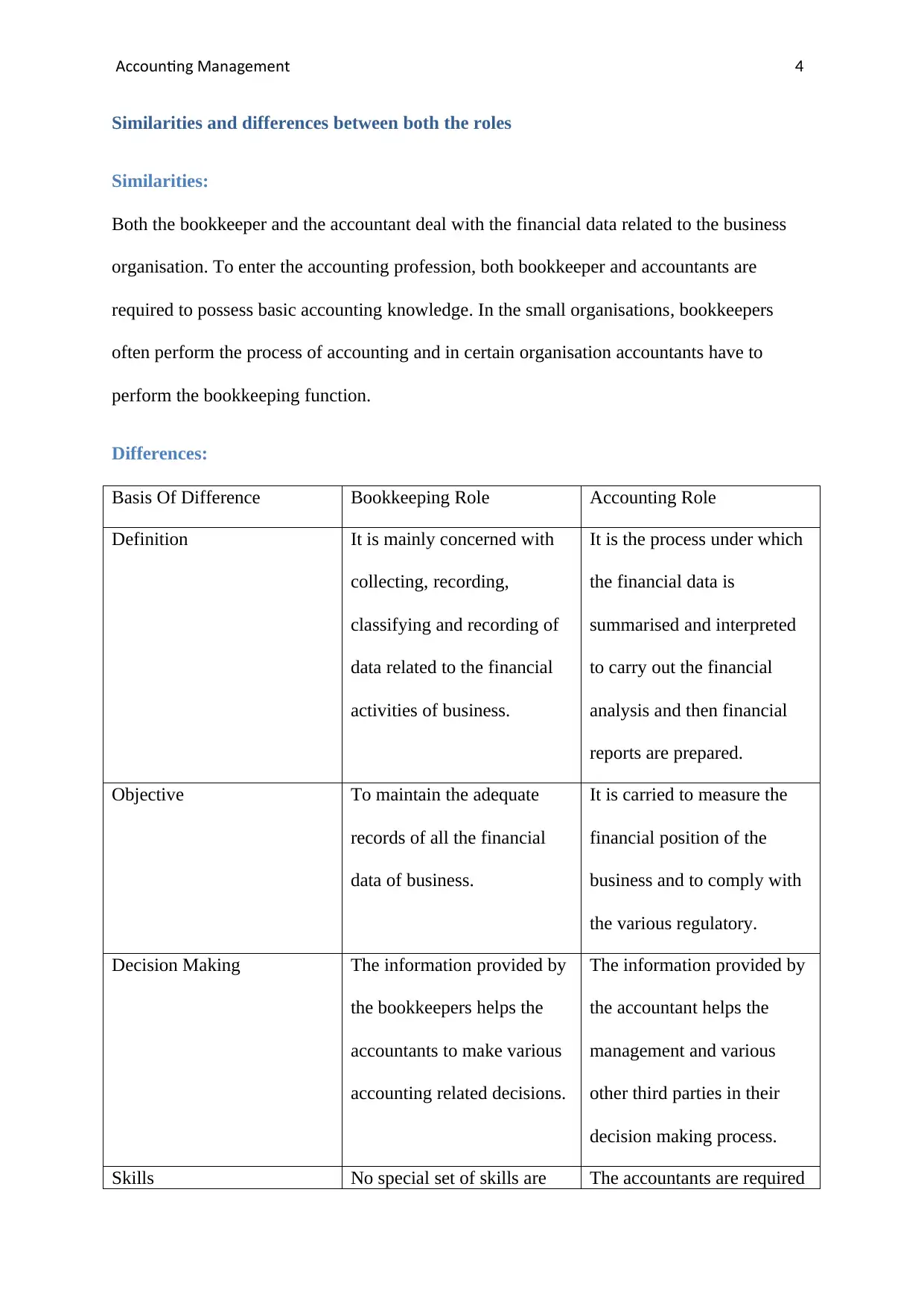
Acco ntin Mana ementu g g 4
Similarities and differences between both the roles
Similarities:
Both the bookkeeper and the accountant deal with the financial data related to the business
organisation. To enter the accounting profession, both bookkeeper and accountants are
required to possess basic accounting knowledge. In the small organisations, bookkeepers
often perform the process of accounting and in certain organisation accountants have to
perform the bookkeeping function.
Differences:
Basis Of Difference Bookkeeping Role Accounting Role
Definition It is mainly concerned with
collecting, recording,
classifying and recording of
data related to the financial
activities of business.
It is the process under which
the financial data is
summarised and interpreted
to carry out the financial
analysis and then financial
reports are prepared.
Objective To maintain the adequate
records of all the financial
data of business.
It is carried to measure the
financial position of the
business and to comply with
the various regulatory.
Decision Making The information provided by
the bookkeepers helps the
accountants to make various
accounting related decisions.
The information provided by
the accountant helps the
management and various
other third parties in their
decision making process.
Skills No special set of skills are The accountants are required
Similarities and differences between both the roles
Similarities:
Both the bookkeeper and the accountant deal with the financial data related to the business
organisation. To enter the accounting profession, both bookkeeper and accountants are
required to possess basic accounting knowledge. In the small organisations, bookkeepers
often perform the process of accounting and in certain organisation accountants have to
perform the bookkeeping function.
Differences:
Basis Of Difference Bookkeeping Role Accounting Role
Definition It is mainly concerned with
collecting, recording,
classifying and recording of
data related to the financial
activities of business.
It is the process under which
the financial data is
summarised and interpreted
to carry out the financial
analysis and then financial
reports are prepared.
Objective To maintain the adequate
records of all the financial
data of business.
It is carried to measure the
financial position of the
business and to comply with
the various regulatory.
Decision Making The information provided by
the bookkeepers helps the
accountants to make various
accounting related decisions.
The information provided by
the accountant helps the
management and various
other third parties in their
decision making process.
Skills No special set of skills are The accountants are required
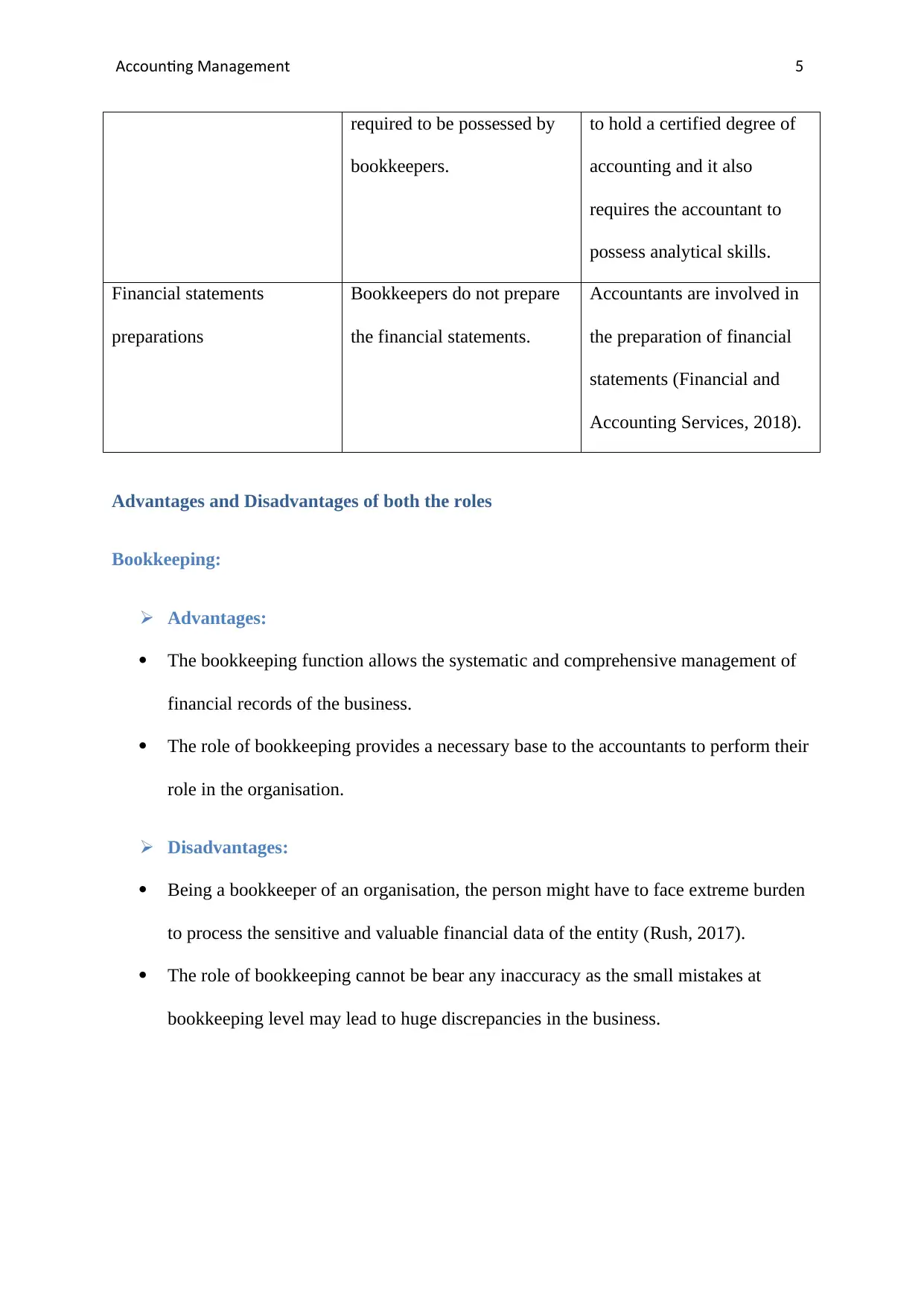
Acco ntin Mana ementu g g 5
required to be possessed by
bookkeepers.
to hold a certified degree of
accounting and it also
requires the accountant to
possess analytical skills.
Financial statements
preparations
Bookkeepers do not prepare
the financial statements.
Accountants are involved in
the preparation of financial
statements (Financial and
Accounting Services, 2018).
Advantages and Disadvantages of both the roles
Bookkeeping:
Advantages:
The bookkeeping function allows the systematic and comprehensive management of
financial records of the business.
The role of bookkeeping provides a necessary base to the accountants to perform their
role in the organisation.
Disadvantages:
Being a bookkeeper of an organisation, the person might have to face extreme burden
to process the sensitive and valuable financial data of the entity (Rush, 2017).
The role of bookkeeping cannot be bear any inaccuracy as the small mistakes at
bookkeeping level may lead to huge discrepancies in the business.
required to be possessed by
bookkeepers.
to hold a certified degree of
accounting and it also
requires the accountant to
possess analytical skills.
Financial statements
preparations
Bookkeepers do not prepare
the financial statements.
Accountants are involved in
the preparation of financial
statements (Financial and
Accounting Services, 2018).
Advantages and Disadvantages of both the roles
Bookkeeping:
Advantages:
The bookkeeping function allows the systematic and comprehensive management of
financial records of the business.
The role of bookkeeping provides a necessary base to the accountants to perform their
role in the organisation.
Disadvantages:
Being a bookkeeper of an organisation, the person might have to face extreme burden
to process the sensitive and valuable financial data of the entity (Rush, 2017).
The role of bookkeeping cannot be bear any inaccuracy as the small mistakes at
bookkeeping level may lead to huge discrepancies in the business.
⊘ This is a preview!⊘
Do you want full access?
Subscribe today to unlock all pages.

Trusted by 1+ million students worldwide
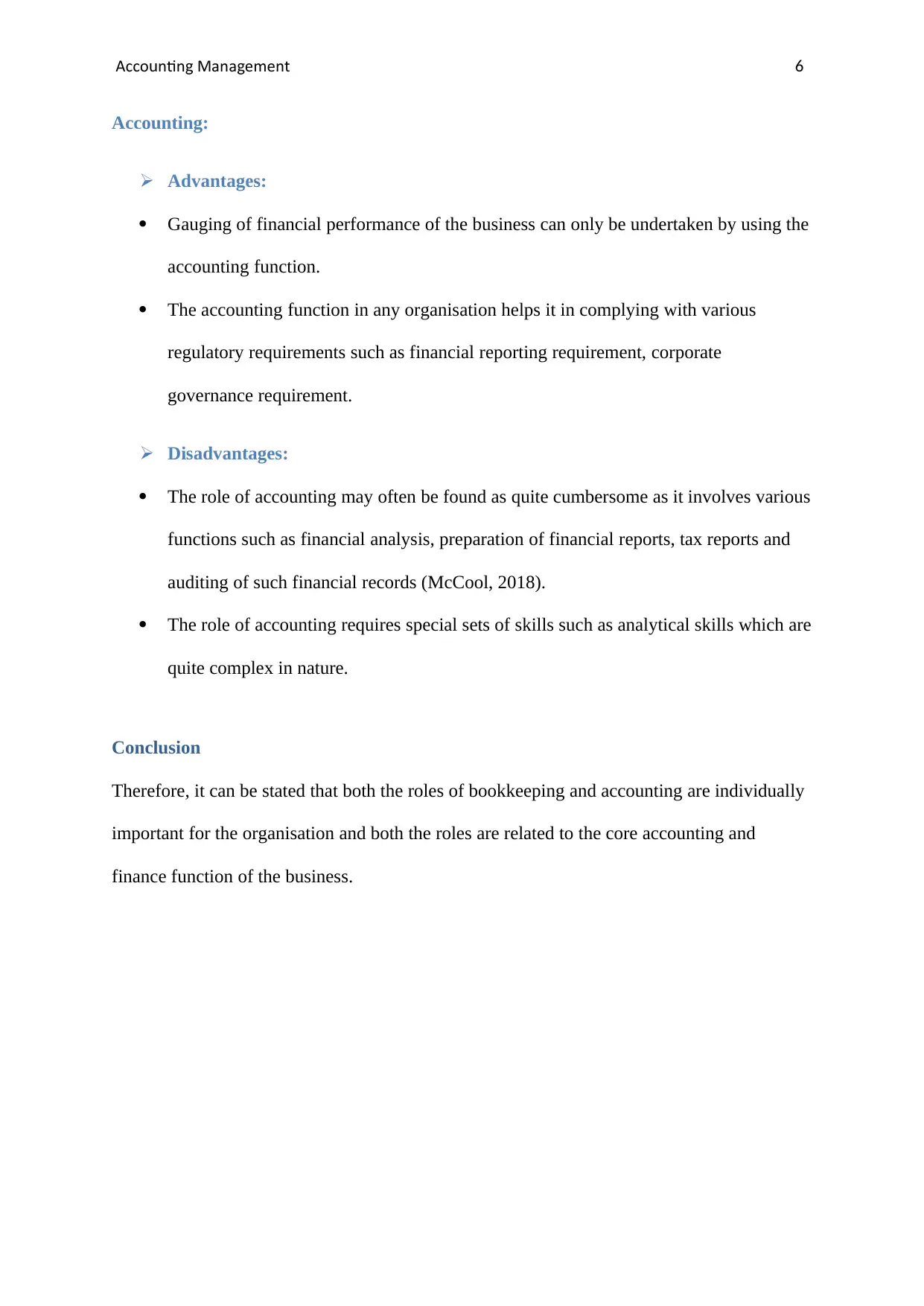
Acco ntin Mana ementu g g 6
Accounting:
Advantages:
Gauging of financial performance of the business can only be undertaken by using the
accounting function.
The accounting function in any organisation helps it in complying with various
regulatory requirements such as financial reporting requirement, corporate
governance requirement.
Disadvantages:
The role of accounting may often be found as quite cumbersome as it involves various
functions such as financial analysis, preparation of financial reports, tax reports and
auditing of such financial records (McCool, 2018).
The role of accounting requires special sets of skills such as analytical skills which are
quite complex in nature.
Conclusion
Therefore, it can be stated that both the roles of bookkeeping and accounting are individually
important for the organisation and both the roles are related to the core accounting and
finance function of the business.
Accounting:
Advantages:
Gauging of financial performance of the business can only be undertaken by using the
accounting function.
The accounting function in any organisation helps it in complying with various
regulatory requirements such as financial reporting requirement, corporate
governance requirement.
Disadvantages:
The role of accounting may often be found as quite cumbersome as it involves various
functions such as financial analysis, preparation of financial reports, tax reports and
auditing of such financial records (McCool, 2018).
The role of accounting requires special sets of skills such as analytical skills which are
quite complex in nature.
Conclusion
Therefore, it can be stated that both the roles of bookkeeping and accounting are individually
important for the organisation and both the roles are related to the core accounting and
finance function of the business.
Paraphrase This Document
Need a fresh take? Get an instant paraphrase of this document with our AI Paraphraser
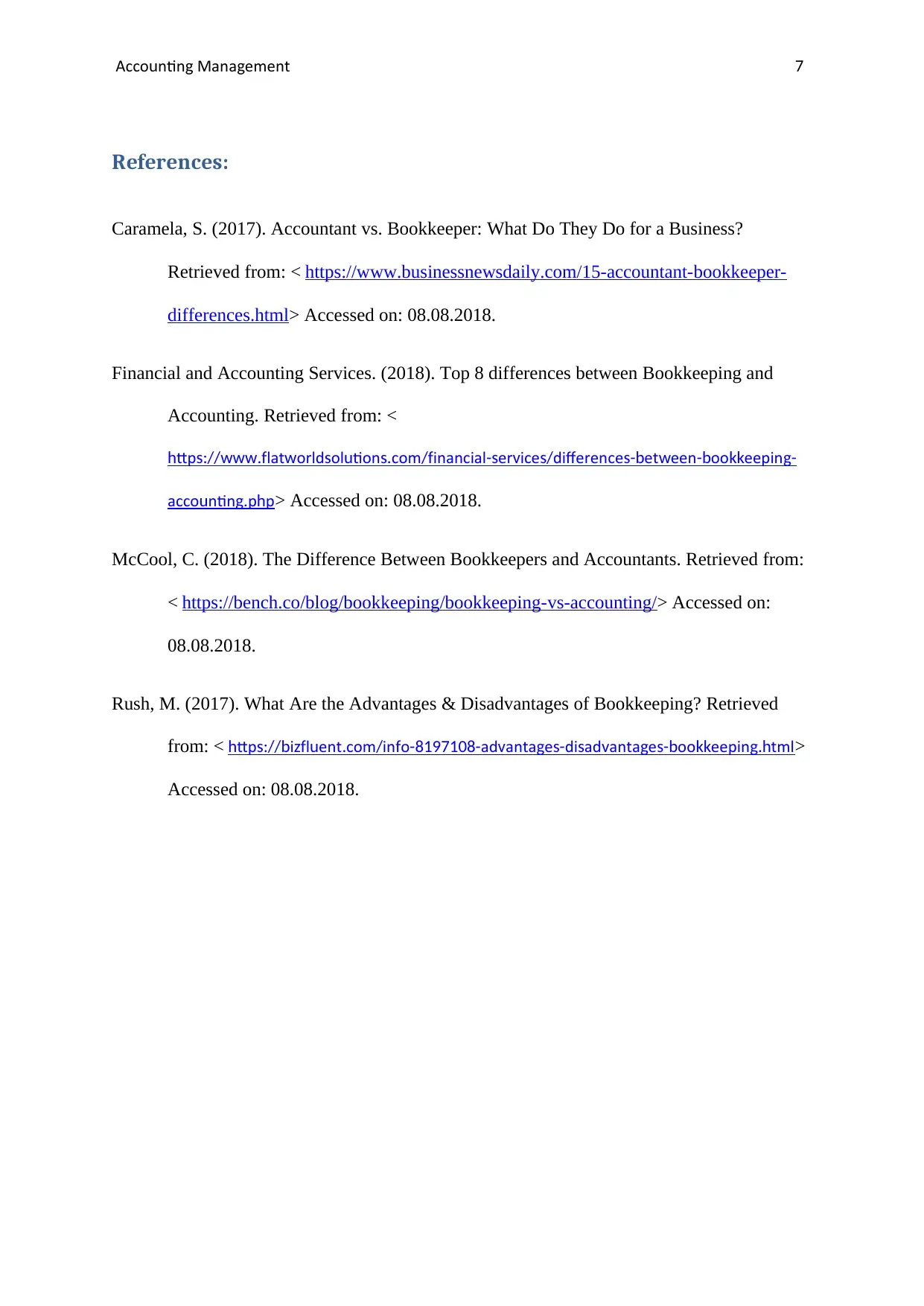
Acco ntin Mana ementu g g 7
References:
Caramela, S. (2017). Accountant vs. Bookkeeper: What Do They Do for a Business?
Retrieved from: < https://www.businessnewsdaily.com/15-accountant-bookkeeper-
differences.html> Accessed on: 08.08.2018.
Financial and Accounting Services. (2018). Top 8 differences between Bookkeeping and
Accounting. Retrieved from: <
ttp lat orld ol tion com inancial er ice di erence et een oo eepinh s://www.f w s u s. /f -s v s/ ff s-b w -b kk g-
acco ntin p pu g. h > Accessed on: 08.08.2018.
McCool, C. (2018). The Difference Between Bookkeepers and Accountants. Retrieved from:
< https://bench.co/blog/bookkeeping/bookkeeping-vs-accounting/> Accessed on:
08.08.2018.
Rush, M. (2017). What Are the Advantages & Disadvantages of Bookkeeping? Retrieved
from: < ttp i l ent com in o ad anta e di ad anta e oo eepin tmlh s://b zf u . / f -8197108- v g s- s v g s-b kk g.h >
Accessed on: 08.08.2018.
References:
Caramela, S. (2017). Accountant vs. Bookkeeper: What Do They Do for a Business?
Retrieved from: < https://www.businessnewsdaily.com/15-accountant-bookkeeper-
differences.html> Accessed on: 08.08.2018.
Financial and Accounting Services. (2018). Top 8 differences between Bookkeeping and
Accounting. Retrieved from: <
ttp lat orld ol tion com inancial er ice di erence et een oo eepinh s://www.f w s u s. /f -s v s/ ff s-b w -b kk g-
acco ntin p pu g. h > Accessed on: 08.08.2018.
McCool, C. (2018). The Difference Between Bookkeepers and Accountants. Retrieved from:
< https://bench.co/blog/bookkeeping/bookkeeping-vs-accounting/> Accessed on:
08.08.2018.
Rush, M. (2017). What Are the Advantages & Disadvantages of Bookkeeping? Retrieved
from: < ttp i l ent com in o ad anta e di ad anta e oo eepin tmlh s://b zf u . / f -8197108- v g s- s v g s-b kk g.h >
Accessed on: 08.08.2018.
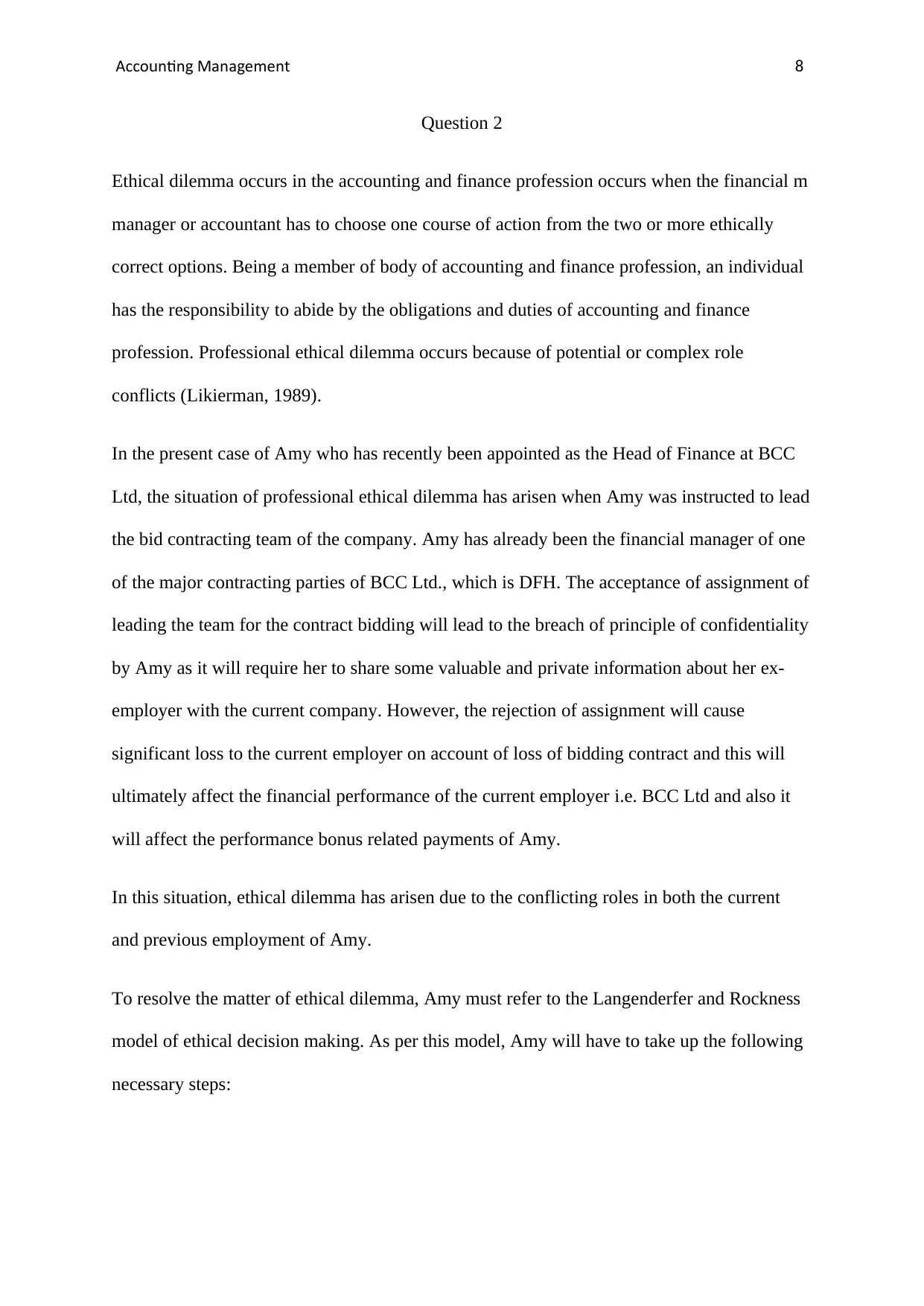
Acco ntin Mana ementu g g 8
Question 2
Ethical dilemma occurs in the accounting and finance profession occurs when the financial m
manager or accountant has to choose one course of action from the two or more ethically
correct options. Being a member of body of accounting and finance profession, an individual
has the responsibility to abide by the obligations and duties of accounting and finance
profession. Professional ethical dilemma occurs because of potential or complex role
conflicts (Likierman, 1989).
In the present case of Amy who has recently been appointed as the Head of Finance at BCC
Ltd, the situation of professional ethical dilemma has arisen when Amy was instructed to lead
the bid contracting team of the company. Amy has already been the financial manager of one
of the major contracting parties of BCC Ltd., which is DFH. The acceptance of assignment of
leading the team for the contract bidding will lead to the breach of principle of confidentiality
by Amy as it will require her to share some valuable and private information about her ex-
employer with the current company. However, the rejection of assignment will cause
significant loss to the current employer on account of loss of bidding contract and this will
ultimately affect the financial performance of the current employer i.e. BCC Ltd and also it
will affect the performance bonus related payments of Amy.
In this situation, ethical dilemma has arisen due to the conflicting roles in both the current
and previous employment of Amy.
To resolve the matter of ethical dilemma, Amy must refer to the Langenderfer and Rockness
model of ethical decision making. As per this model, Amy will have to take up the following
necessary steps:
Question 2
Ethical dilemma occurs in the accounting and finance profession occurs when the financial m
manager or accountant has to choose one course of action from the two or more ethically
correct options. Being a member of body of accounting and finance profession, an individual
has the responsibility to abide by the obligations and duties of accounting and finance
profession. Professional ethical dilemma occurs because of potential or complex role
conflicts (Likierman, 1989).
In the present case of Amy who has recently been appointed as the Head of Finance at BCC
Ltd, the situation of professional ethical dilemma has arisen when Amy was instructed to lead
the bid contracting team of the company. Amy has already been the financial manager of one
of the major contracting parties of BCC Ltd., which is DFH. The acceptance of assignment of
leading the team for the contract bidding will lead to the breach of principle of confidentiality
by Amy as it will require her to share some valuable and private information about her ex-
employer with the current company. However, the rejection of assignment will cause
significant loss to the current employer on account of loss of bidding contract and this will
ultimately affect the financial performance of the current employer i.e. BCC Ltd and also it
will affect the performance bonus related payments of Amy.
In this situation, ethical dilemma has arisen due to the conflicting roles in both the current
and previous employment of Amy.
To resolve the matter of ethical dilemma, Amy must refer to the Langenderfer and Rockness
model of ethical decision making. As per this model, Amy will have to take up the following
necessary steps:
⊘ This is a preview!⊘
Do you want full access?
Subscribe today to unlock all pages.

Trusted by 1+ million students worldwide
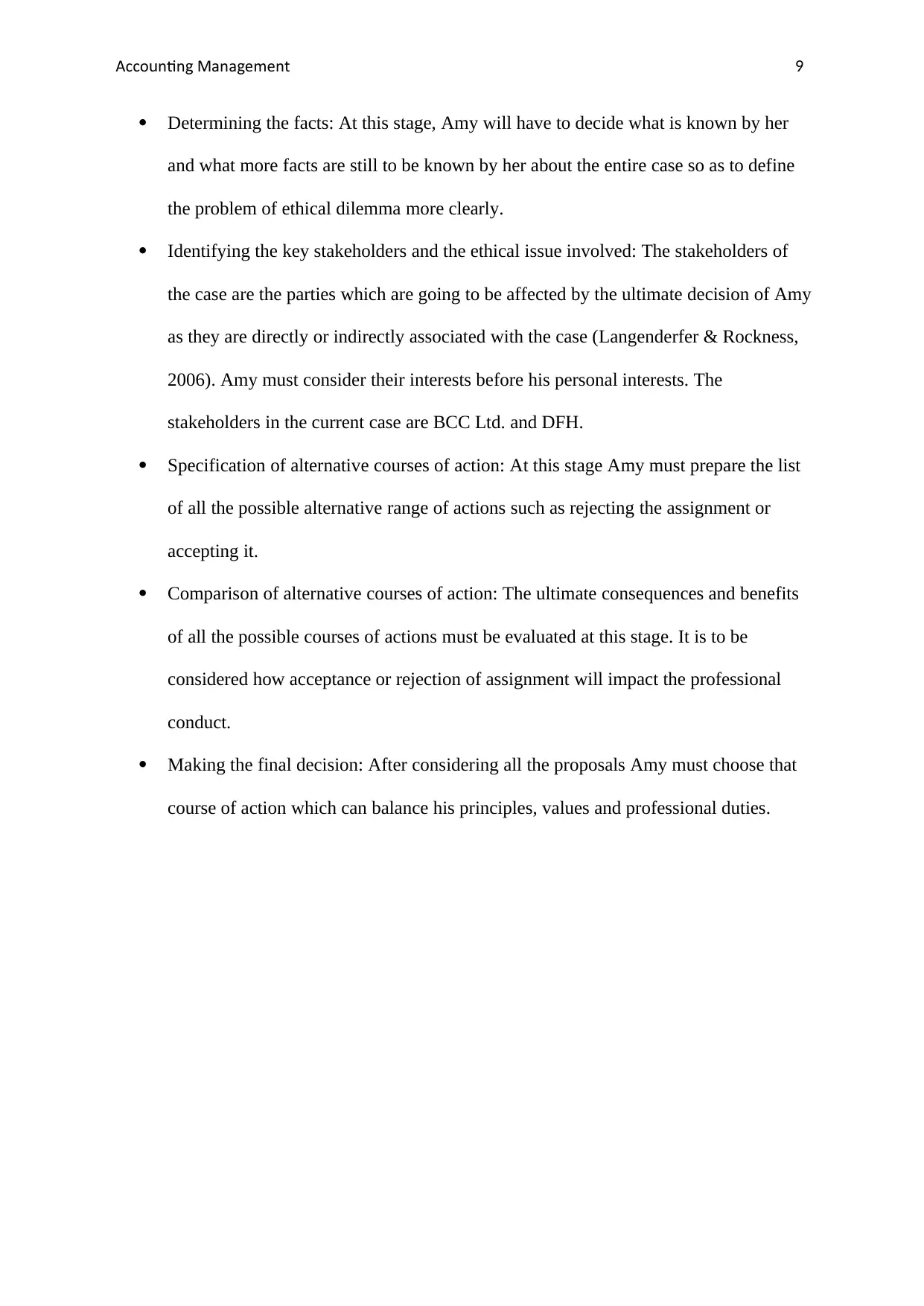
Acco ntin Mana ementu g g 9
Determining the facts: At this stage, Amy will have to decide what is known by her
and what more facts are still to be known by her about the entire case so as to define
the problem of ethical dilemma more clearly.
Identifying the key stakeholders and the ethical issue involved: The stakeholders of
the case are the parties which are going to be affected by the ultimate decision of Amy
as they are directly or indirectly associated with the case (Langenderfer & Rockness,
2006). Amy must consider their interests before his personal interests. The
stakeholders in the current case are BCC Ltd. and DFH.
Specification of alternative courses of action: At this stage Amy must prepare the list
of all the possible alternative range of actions such as rejecting the assignment or
accepting it.
Comparison of alternative courses of action: The ultimate consequences and benefits
of all the possible courses of actions must be evaluated at this stage. It is to be
considered how acceptance or rejection of assignment will impact the professional
conduct.
Making the final decision: After considering all the proposals Amy must choose that
course of action which can balance his principles, values and professional duties.
Determining the facts: At this stage, Amy will have to decide what is known by her
and what more facts are still to be known by her about the entire case so as to define
the problem of ethical dilemma more clearly.
Identifying the key stakeholders and the ethical issue involved: The stakeholders of
the case are the parties which are going to be affected by the ultimate decision of Amy
as they are directly or indirectly associated with the case (Langenderfer & Rockness,
2006). Amy must consider their interests before his personal interests. The
stakeholders in the current case are BCC Ltd. and DFH.
Specification of alternative courses of action: At this stage Amy must prepare the list
of all the possible alternative range of actions such as rejecting the assignment or
accepting it.
Comparison of alternative courses of action: The ultimate consequences and benefits
of all the possible courses of actions must be evaluated at this stage. It is to be
considered how acceptance or rejection of assignment will impact the professional
conduct.
Making the final decision: After considering all the proposals Amy must choose that
course of action which can balance his principles, values and professional duties.
Paraphrase This Document
Need a fresh take? Get an instant paraphrase of this document with our AI Paraphraser
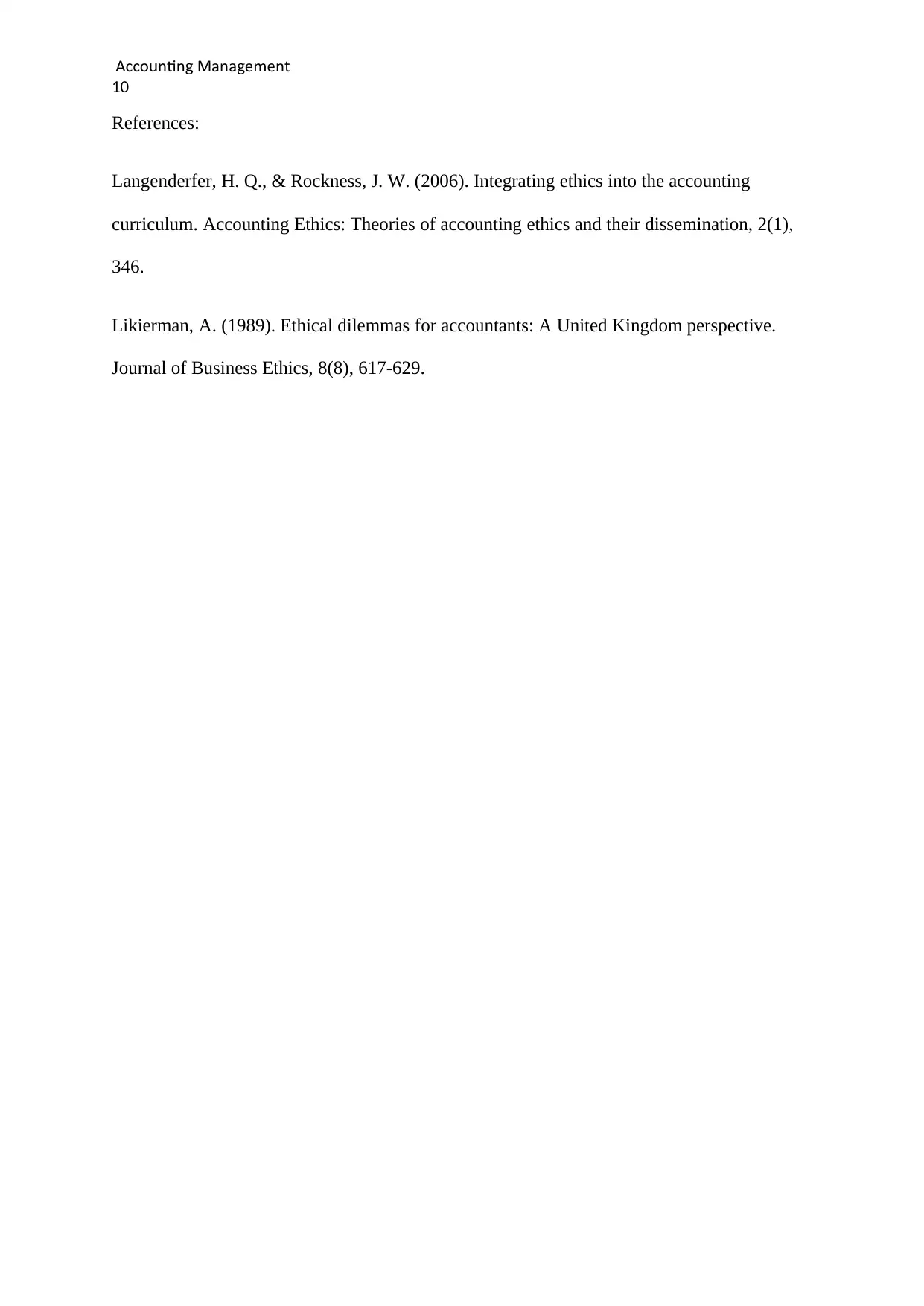
Acco ntin Mana ementu g g
10
References:
Langenderfer, H. Q., & Rockness, J. W. (2006). Integrating ethics into the accounting
curriculum. Accounting Ethics: Theories of accounting ethics and their dissemination, 2(1),
346.
Likierman, A. (1989). Ethical dilemmas for accountants: A United Kingdom perspective.
Journal of Business Ethics, 8(8), 617-629.
10
References:
Langenderfer, H. Q., & Rockness, J. W. (2006). Integrating ethics into the accounting
curriculum. Accounting Ethics: Theories of accounting ethics and their dissemination, 2(1),
346.
Likierman, A. (1989). Ethical dilemmas for accountants: A United Kingdom perspective.
Journal of Business Ethics, 8(8), 617-629.
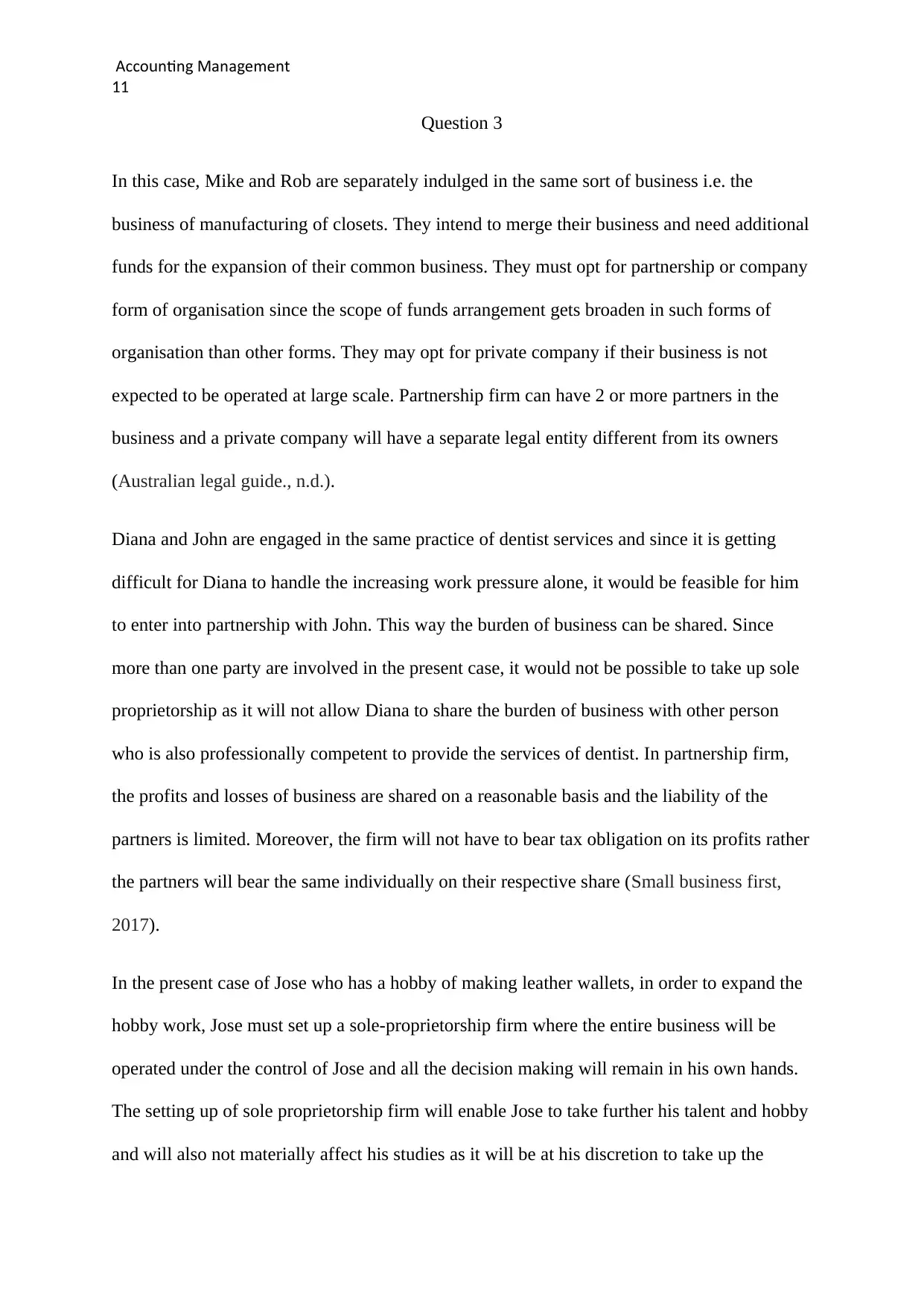
Acco ntin Mana ementu g g
11
Question 3
In this case, Mike and Rob are separately indulged in the same sort of business i.e. the
business of manufacturing of closets. They intend to merge their business and need additional
funds for the expansion of their common business. They must opt for partnership or company
form of organisation since the scope of funds arrangement gets broaden in such forms of
organisation than other forms. They may opt for private company if their business is not
expected to be operated at large scale. Partnership firm can have 2 or more partners in the
business and a private company will have a separate legal entity different from its owners
(Australian legal guide., n.d.).
Diana and John are engaged in the same practice of dentist services and since it is getting
difficult for Diana to handle the increasing work pressure alone, it would be feasible for him
to enter into partnership with John. This way the burden of business can be shared. Since
more than one party are involved in the present case, it would not be possible to take up sole
proprietorship as it will not allow Diana to share the burden of business with other person
who is also professionally competent to provide the services of dentist. In partnership firm,
the profits and losses of business are shared on a reasonable basis and the liability of the
partners is limited. Moreover, the firm will not have to bear tax obligation on its profits rather
the partners will bear the same individually on their respective share (Small business first,
2017).
In the present case of Jose who has a hobby of making leather wallets, in order to expand the
hobby work, Jose must set up a sole-proprietorship firm where the entire business will be
operated under the control of Jose and all the decision making will remain in his own hands.
The setting up of sole proprietorship firm will enable Jose to take further his talent and hobby
and will also not materially affect his studies as it will be at his discretion to take up the
11
Question 3
In this case, Mike and Rob are separately indulged in the same sort of business i.e. the
business of manufacturing of closets. They intend to merge their business and need additional
funds for the expansion of their common business. They must opt for partnership or company
form of organisation since the scope of funds arrangement gets broaden in such forms of
organisation than other forms. They may opt for private company if their business is not
expected to be operated at large scale. Partnership firm can have 2 or more partners in the
business and a private company will have a separate legal entity different from its owners
(Australian legal guide., n.d.).
Diana and John are engaged in the same practice of dentist services and since it is getting
difficult for Diana to handle the increasing work pressure alone, it would be feasible for him
to enter into partnership with John. This way the burden of business can be shared. Since
more than one party are involved in the present case, it would not be possible to take up sole
proprietorship as it will not allow Diana to share the burden of business with other person
who is also professionally competent to provide the services of dentist. In partnership firm,
the profits and losses of business are shared on a reasonable basis and the liability of the
partners is limited. Moreover, the firm will not have to bear tax obligation on its profits rather
the partners will bear the same individually on their respective share (Small business first,
2017).
In the present case of Jose who has a hobby of making leather wallets, in order to expand the
hobby work, Jose must set up a sole-proprietorship firm where the entire business will be
operated under the control of Jose and all the decision making will remain in his own hands.
The setting up of sole proprietorship firm will enable Jose to take further his talent and hobby
and will also not materially affect his studies as it will be at his discretion to take up the
⊘ This is a preview!⊘
Do you want full access?
Subscribe today to unlock all pages.

Trusted by 1+ million students worldwide
1 out of 14
Related Documents
Your All-in-One AI-Powered Toolkit for Academic Success.
+13062052269
info@desklib.com
Available 24*7 on WhatsApp / Email
![[object Object]](/_next/static/media/star-bottom.7253800d.svg)
Unlock your academic potential
Copyright © 2020–2026 A2Z Services. All Rights Reserved. Developed and managed by ZUCOL.




